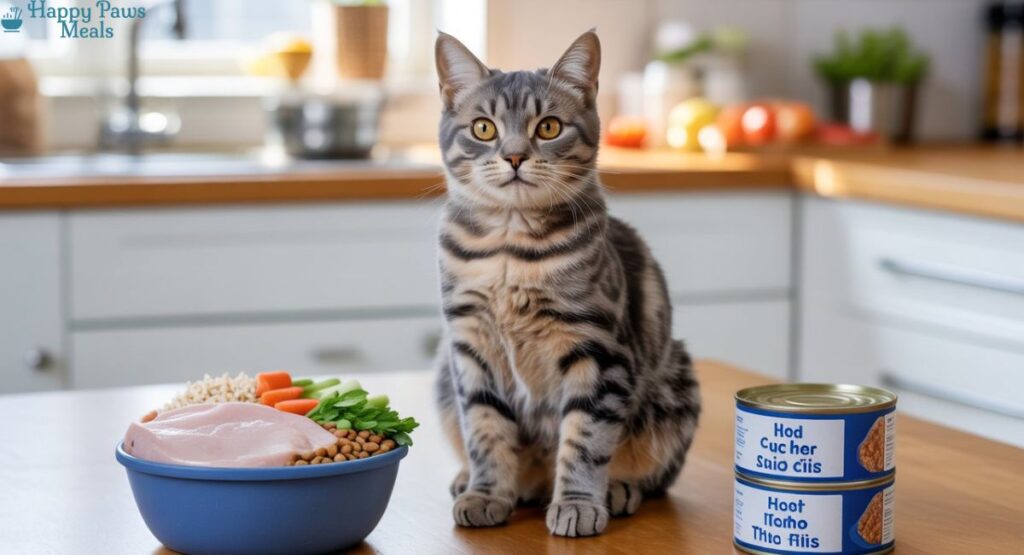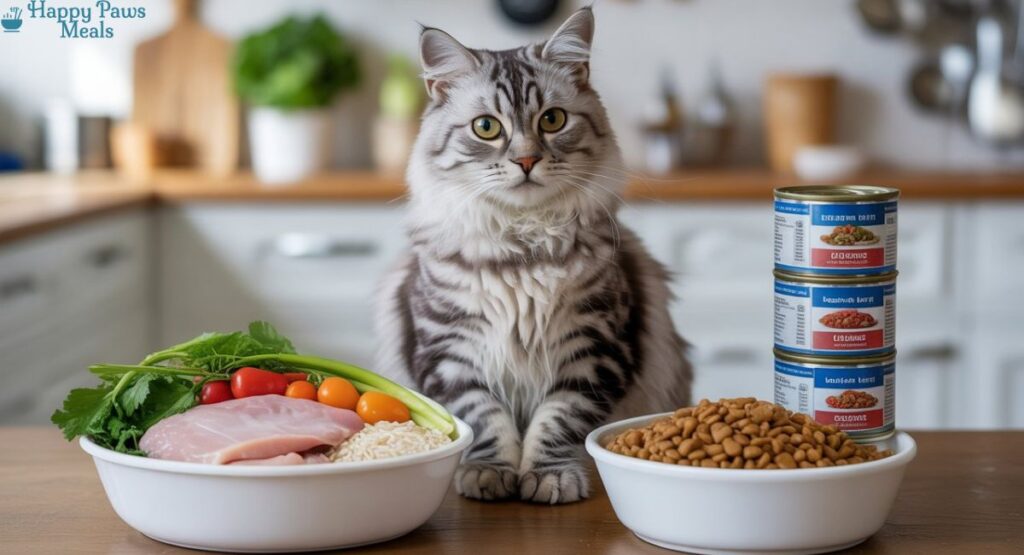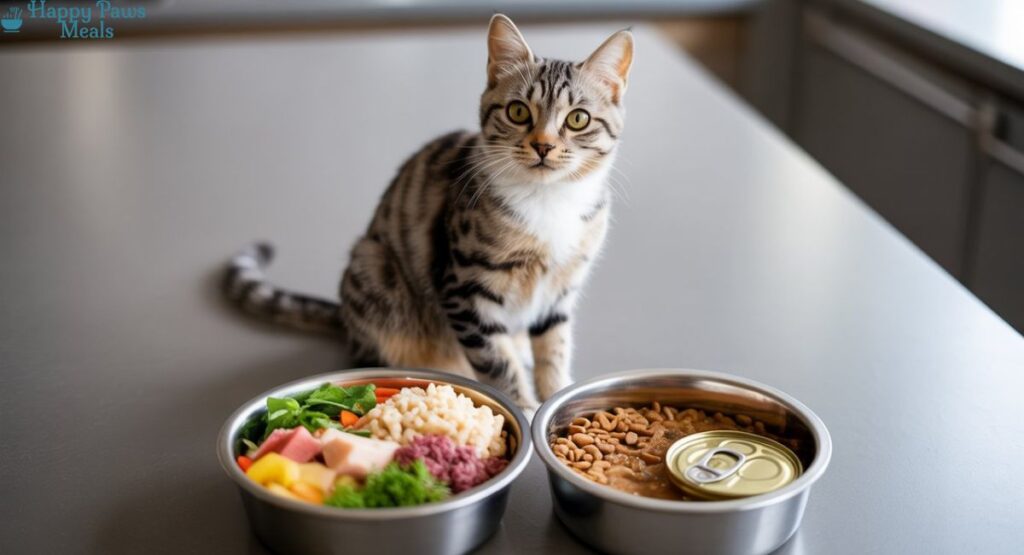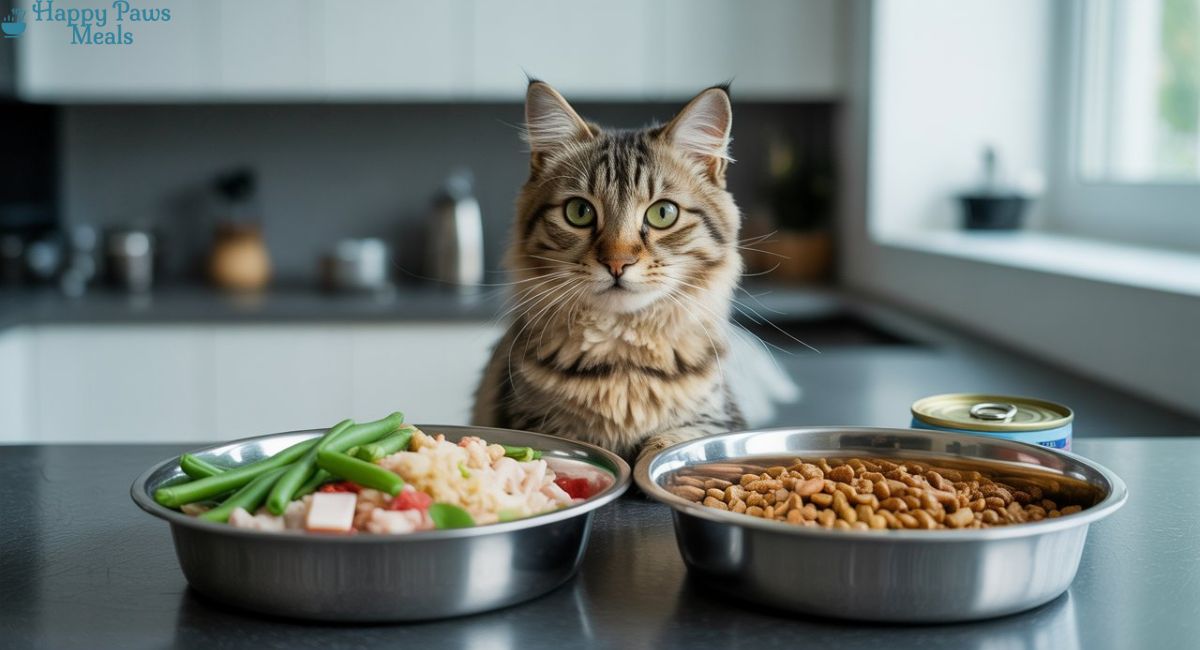When it comes to your cat’s diet, the debate of homemade cat food vs store-bought continues to grow among pet parents. Many cat owners want complete control over ingredients, while others prefer the convenience of commercial options. But which is truly better for your cat’s health, safety, and long-term well-being?
In this guide, we’ll explore the pros and cons of homemade and store-bought cat food, highlight nutritional requirements, compare costs, and answer the most common questions cat owners ask. By the end, you’ll know which option fits your cat’s unique lifestyle.
When comparing homemade cat food vs store-bought, many cat owners are surprised by how different the benefits can be. Store-bought diets are regulated and balanced, while homemade meals allow freedom and control over ingredients. Knowing these differences helps you decide which approach suits your cat’s health, lifestyle, and your own convenience.
Nutritional Needs of Cats
Before we compare homemade cat food vs store-bought diets, it’s important to understand what cats actually need. Choosing between homemade cat food vs store-bought can feel overwhelming for new cat owners. Cats are obligate carnivores, which means:
- They require high protein from animal sources.
- They need taurine, an amino acid not found in plant-based diets.
- Vitamins like A, D, and B12 must come from animal products.
- Essential fatty acids (arachidonic acid, omega-3s) are necessary.

👉 According to AAFCO Cat Food Nutrient Standards, all commercial cat food labeled “complete and balanced” must meet strict nutritional guidelines. Homemade diets, on the other hand, depend heavily on the pet parent’s ability to properly balance nutrients. Pet parents who choose homemade cat food vs store-bought often highlight freshness, fewer additives, and tailored nutrition as key reasons. Veterinarians often stress that both homemade cat food vs store-bought diets have unique risks and benefits.
Homemade Cat Food: Pros & Cons
✅ Pros of Homemade Cat Food
- Ingredient Control – You know exactly what’s going into your cat’s bowl.
- No Fillers or Preservatives – You can avoid artificial additives often found in commercial brands.
- Customizable Recipes – Homemade diets can be tailored to cats with allergies, sensitivities, or specific health conditions.
- Freshness – Meals are freshly prepared, ensuring no long storage or processing.
- Bonding – Preparing your cat’s food can feel rewarding and strengthen your bond.
❌ Cons of Homemade Cat Food
- Nutritional Imbalance Risk – Without vet guidance, many homemade diets lack taurine, calcium, and vitamins.
- Time-Consuming – Daily or weekly meal prep can be difficult for busy owners.
- Higher Cost (sometimes) – Quality meats and supplements can be more expensive than kibble.
- Storage Issues – Fresh food spoils quickly and needs refrigeration or freezing.
- Vet Supervision Needed – Improper homemade diets can cause malnutrition over time.

The rising debate of homemade cat food vs store-bought shows how much pet parents care about nutrition.
Store-Bought Cat Food: Pros & Cons
While the debate of homemade cat food vs store-bought continues, commercial brands have improved dramatically in recent years. Many grain-free, high-protein, and specialty formulas now provide better nutrition than poorly balanced homemade meals. Pet parents switching from store-bought to homemade cat food often notice changes in energy and coat health
✅ Pros of Store-Bought Cat Food
- Complete & Balanced – Reputable brands follow AAFCO nutrient standards.
- Convenience – Ready-to-serve, with options for dry, wet, freeze-dried, and raw diets.
- Wide Variety – Grain-free, high-protein, weight-loss, and prescription diets available.
- Cost-Effective – Dry kibble and some canned foods are budget-friendly.
- Safety Testing – Major brands test for toxins, pathogens, and proper nutrient levels.
❌ Cons of Store-Bought Cat Food
- Quality Varies – Cheap brands may use fillers, by-products, or artificial additives.
- Processing – Some nutrients may degrade during cooking or extrusion.
- Recalls Happen – Occasionally, contamination or mislabeling leads to recalls.
- Picky Eaters – Some cats reject commercial food due to taste preferences.
- Less Control – Pet parents rely on the manufacturer’s ingredient choices.
Cost Comparison: Homemade vs Store-Bought
When evaluating homemade cat food vs store-bought, cost plays a major role. While homemade diets may look healthier, the expenses of supplements and premium meats often outweigh high-quality kibble or canned food.
| Type of Diet | Average Monthly Cost | Notes |
|---|---|---|
| Homemade (raw or cooked) | $80–$200 | Depends on protein sources and supplements |
| Premium Wet Food | $60–$120 | Balanced, palatable, more costly than kibble |
| Dry Kibble (mid-range) | $30–$60 | Most affordable, but quality varies |
| Freeze-Dried/Raw Commercial | $90–$200 | Convenient but among the most expensive |
👉 For budget-conscious owners, high-quality kibble or canned food may be more practical than preparing homemade cat food.
Safety Concerns
The safety debate of homemade cat food vs store-bought comes down to control versus testing. Homemade food requires strict handling and supplements to avoid deficiencies, while store-bought food goes through testing and regulation to meet AAFCO standards.
Homemade Diet Safety
Homemade food must be carefully balanced with supplements (calcium, taurine, vitamins). Without them, cats may suffer from deficiencies, weak bones, or heart issues. Always consult a vet or a veterinary nutritionist before starting homemade feeding.
Store-Bought Safety
Store-bought food is regulated, but occasional recalls happen. Always buy from reputable brands and check for updates on FDA Pet Food Safety Guidelines to avoid risks.

Feeding Tips
- If feeding homemade, work with a vet nutritionist to ensure balanced recipes.
- Rotate between wet and dry food for hydration and dental health.
- For overweight cats, try High-Protein Cat Food for Weight Loss (internal link).
- Maintain consistent Feeding Hours for Cats (internal link) to avoid overeating.
- If switching diets, transition gradually over 7–10 days.
If you’re also exploring healthier feline diets, check out our guide on [High-Protein Cat Food for Weight Loss]
FAQs About Homemade vs Store-Bought Cat Food
Q1: Is homemade cat food healthier than store-bought?
Not always. Homemade diets can be very healthy if properly balanced, but without supplements, they often lack key nutrients.
Q2: Can I feed my cat only homemade food?
Yes, but it must be designed by a vet nutritionist to avoid deficiencies.
Q3: Which is cheaper, homemade or store-bought?
Store-bought kibble is usually cheaper. Homemade diets with fresh meat and supplements can cost much more.
Q4: Do vets recommend homemade cat food?
Most vets recommend high-quality commercial food unless a homemade diet is professionally formulated.
Q5: Can I mix homemade and store-bought cat food?
Yes, some pet parents do this to balance convenience with freshness. Just ensure overall nutrition meets AAFCO standards.
Conclusion
The choice between homemade cat food vs store-bought depends on your priorities. If you want full control over ingredients and have time to prepare meals with vet guidance, homemade may work. If you prefer convenience, safety, and guaranteed nutritional balance, store-bought is a reliable choice. In the end, the decision between homemade cat food vs store-bought should be based on your cat’s unique health needs, your budget, and how much time you can commit to meal preparation.
👉 The best option often lies in a combination—feeding high-quality store-bought cat food while occasionally supplementing with homemade treats or meals.

I’m Awais Manzoor, the writer behind HappyPawsMeals. With years of interest in pet care and nutrition, I research and review cat and dog food to provide reliable, easy-to-understand advice for pet parents.


1 thought on “Homemade Cat Food vs Store-Bought: Pros & Cons (Complete Guide for 2026)”